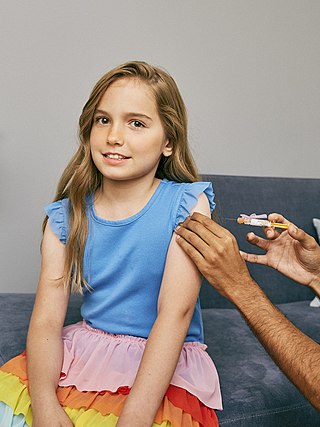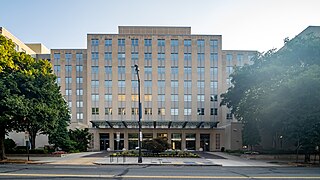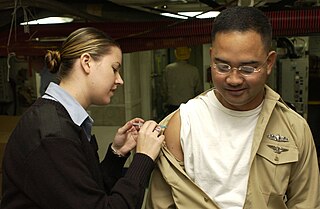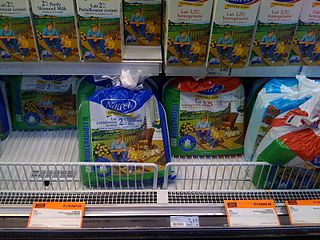
Vaccination is the administration of a vaccine to help the immune system develop immunity from a disease. Vaccines contain a microorganism or virus in a weakened, live or killed state, or proteins or toxins from the organism. In stimulating the body's adaptive immunity, they help prevent sickness from an infectious disease. When a sufficiently large percentage of a population has been vaccinated, herd immunity results. Herd immunity protects those who may be immunocompromised and cannot get a vaccine because even a weakened version would harm them. The effectiveness of vaccination has been widely studied and verified. Vaccination is the most effective method of preventing infectious diseases; widespread immunity due to vaccination is largely responsible for the worldwide eradication of smallpox and the elimination of diseases such as polio and tetanus from much of the world. However, some diseases, such as measles outbreaks in America, have seen rising cases due to relatively low vaccination rates in the 2010s – attributed, in part, to vaccine hesitancy. According to the World Health Organization, vaccination prevents 3.5–5 million deaths per year.

A think tank, or public policy institute, is a research institute that performs research and advocacy concerning topics such as social policy, political strategy, economics, military, technology, and culture. Most think tanks are non-governmental organizations, but some are semi-autonomous agencies within government, and some are associated with particular political parties, businesses or the military. Think tanks are often funded by individual donations, with many also accepting government grants.

Richard Edward Geoffrey Howe, Baron Howe of Aberavon,, known from 1970 to 1992 as Sir Geoffrey Howe, was a British politician who served as Deputy Prime Minister of the United Kingdom from 1989 to 1990. A member of the Conservative Party, he was Margaret Thatcher's longest-serving Cabinet minister, successively holding the posts of chancellor of the Exchequer, foreign secretary, and finally leader of the House of Commons, deputy prime minister and lord president of the Council. His resignation on 1 November 1990 is widely considered to have precipitated the leadership challenge that led to Thatcher's resignation three weeks later.

The Brookings Institution, often stylized as Brookings, is an American think tank that conducts research and education in the social sciences, primarily in economics, metropolitan policy, governance, foreign policy, global economy, and economic development.

The Fraser Institute is a libertarian-conservative Canadian public policy think tank and registered charity. It is headquartered in Vancouver, with additional offices in Calgary, Toronto, and Montreal. It has links to think tanks worldwide through the Economic Freedom Network and is a member of the free-market Atlas Network.

Influenza vaccines, colloquially known as flu shots or the flu jab, are vaccines that protect against infection by influenza viruses. New versions of the vaccines are developed twice a year, as the influenza virus rapidly changes. While their effectiveness varies from year to year, most provide modest to high protection against influenza. Vaccination against influenza began in the 1930s, with large-scale availability in the United States beginning in 1945.

The Canadian Dairy Commission (CDC) is an Ottawa-based Government of Canada Crown Corporation that provides a framework for managing Canada's dairy industry.
The Washington Institute for Near East Policy (WINEP), also known simply as The Washington Institute (TWI), is a pro-Israel American think tank based in Washington, D.C., focused on the foreign policy of the United States in the Near East.

The Urban Institute is a Washington, D.C.–based think tank that conducts economic and social policy research to "open minds, shape decisions, and offer solutions". The institute receives funding from government contracts, foundations, and private donors.
The Canadian Global Affairs Institute (CGAI) is an independent, non-partisan research institute based in Calgary with an office in Ottawa. Incorporated as a charitable organization in 2001, CGAI seeks to focus the national debate and understanding of Canada's international policies, with the ultimate aim of ensuring a more globally engaged Canada.

Sir Chintaman Dwarakanath DeshmukhICS was an Indian civil servant and the first Indian to be appointed the Governor of the Reserve Bank of India in 1943 by the British Raj authorities. He subsequently served as the Finance Minister in the Union Cabinet (1950–1956). It was during this time that he also became a founding member of the Governing Body of NCAER, the National Council of Applied Economic Research in New Delhi, India's first independent economic policy institute established in 1956 at the behest of Prime Minister Jawaharlal Nehru. After resignation from Union Cabinet he worked as Chairman of UGC (1956–1961). He served as Vice-Chancellor of University of Delhi (1962–67). He was also President of Indian Statistical Institute from 1945 to 1964, Honorary Chairman of National Book Trust (1957–60).
A vaccination policy is a health policy adopted in order to prevent the spread of infectious disease. These policies are generally put into place by state or local governments, but may also be set by private facilities, such as workplaces or schools. Many policies have been developed and implemented since vaccines were first made widely available.

Pandemrix is an influenza vaccine for influenza pandemics, such as the 2009 flu pandemic. The vaccine was developed by GlaxoSmithKline (GSK) and patented in September 2006.
The Macdonald–Laurier Institute (MLI) is a public policy think tank located in Ottawa, Ontario, Canada.

Life expectancy in France at birth was 81 years in 2008. A new measure of expected human capital calculated for 195 countries from 1990 to 2016 and defined for each birth cohort as the expected years lived from age 20 to 64 years and adjusted for educational attainment, learning or education quality, and functional health status was published by the Lancet in September 2018. France had the ninth highest level of expected human capital with 25 health, education, and learning-adjusted expected years lived between age 20 and 64 years.
Don Drummond, is a noted Canadian economist, having served extensively in the federal Department of Finance Canada, as Chief Economist at Toronto-Dominion Bank and as a scholar at Queen's University. He is known for his wide contributions to public policy in Canada and extensive citation on economic issues.
The Frontier Centre for Public Policy (FCPP) is a Canadian public policy think tank, founded to "undertake research and education projects in support of economic growth and social outcomes that enhance quality of life". Among the positions promoted by the Centre is climate change denial.

Christopher Thomas Southgate Ragan is a Canadian academic and economist. He has published extensive research on macroeconomics and monetary policy. Ragan is the inaugural director of McGill University's Max Bell School of Public Policy, where he also teaches core macroeconomic and microeconomic policy courses. He is the former chair of Canada's Ecofiscal Commission, a group of Canadian economists that sought to broaden the discussion of environmental pricing reform beyond the academic sphere and into the realm of practical policy application.

Edward Michael Iacobucci is a Canadian legal academic who is a former dean of the University of Toronto Faculty of Law, where he is also the James M. Tory Professor of Law. Before taking over from interim dean Jutta Brunnée on January 1, 2015, for a five-year term, he was a professor in the faculty, the faculty's associate dean of research, and the Osler Chair in Business Law. His primary research areas are corporate law, competition law, and the intersection of economics and the law.

Kwame Julius McKenzie is a British-Canadian psychiatrist employed as the CEO of Wellesley Institute, a policy think tank based in Toronto, Ontario. McKenzie is a full professor in the Department of Psychiatry at the University of Toronto. He has worked as physician, researcher, policy advisor, journalist and broadcaster.
















